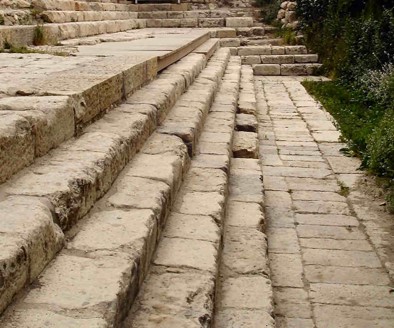
The disciples asked the question for us: Why did this happen?
In John 9 Jesus and his disciples passed by a man blind since birth. His disciples asked Jesus, ““Rabbi, who sinned, this man or his parents, that he was born blind?” It was actually a legitimate question in that Jewish tradition taught at the time that physical infirmities were a result of sin. Since this person had been blind since birth, was his infirmity a result of his sin or his parent’s?
It’s a question we ask in one form or another when confronted with unjust suffering: Why did this happen? A madman kills innocents with a gun. An earthquake kills hundreds in a few seconds. Children contract cancer. Why?
Jesus’ response to his disciples’ question, not only in words but in a nonverbal cue, gives us one of the best handles from Scripture for grappling with the question of why.
First the nonverbal cue. In most English versions of John 9, and reflecting the original Greek, Jesus doesn’t spend one second trying to explain why the man was born blind. He pivots directly into the redemptive good that will come from the situation: “It was not that this man sinned, or his parents, but that the works of God might be displayed in him.” Some versions supply “…but this happened so that…” While this smooths out the conversation, Jesus’ actual response was way more abrupt, giving us a picture of how to handle these situations: Don’t spend too much time asking why; get into the redemptive good as soon as you can. It is, though, important to point out that Jesus didn’t chastise the disciples for their question (as He did in other situations when the disciples’ responses were less than stellar), giving us space to question (and rant and kick pillows and cry in a fetal position). But Jesus wants us to get to the good stuff as quickly as possible.
And here’s the good stuff, which brings us to the words portion of Jesus’ response: “… but that the works of God might be displayed in him.” As you track this story through John 9, you see two works that Jesus may have been referring to, one physical, the other spiritual. First the physical: Jesus gave the man his sight. Jesus made mud with spit, anointed the man’s eyes with the Divine mud and sent him to the Pool of Siloam to wash the mud away. The man “came back seeing.”
Things however, got worse for the man now known as “the man who had been formerly blind,” before they got better. Jesus’ act of healing, which coincidentally happened on the Sabbath as John retroactively pointed out, caused quite the kerfuffle among his neighbors and eventually the local Pharisees. The situation even escalated to the point of the Pharisees calling in his parents to ascertain if this man had indeed been born blind. Was Jesus a miracle worker from God or a sinner who worked on the Sabbath?
After grilling the parents the Pharisees turned again to press with their questions of the “the man who had been formerly blind.” The man, growing impatient, got a bit sarcastic with his answers. The Pharisees, who don’t do sarcasm, “cast him out” which likely means out of the synagogue. This meant not only spiritual isolation but social isolation as well.
This then brings us to the spiritual work of God to be displayed in this man’s life: salvation. Jesus found the man in his “cast out” state. After a brief exchange about believing in the Son of Man, the formerly blind man said “I believe” and he worshipped Jesus. This, I think, is the greater of the two works that Jesus spoke of. Not only did the man’s newly healed eyes get to see Jesus, so did the eyes of his heart (Ephesians 1:8).
Any hardship in our lives can eventually pivot into the redemptive good that will come of it. Like the man who had been formerly blind, the redemption can be both physical and spiritual. In my own journey of loss I found physical redemption through the healing of emotions and the restoring of the ability to love, to name two off the top of my head. I found spiritual redemption through a deeper, more dynamic relationship with God as well as through a desire to be a “pay it forward” believer, wanting to comfort others out of the comfort I had received (2 Corinthians 1:4). Again, to name just two off the top of my head.
It’s okay to ask the question of why. But don’t let that question keep you from the good stuff. Jesus will be ready to pivot to the redemptive good whenever you are.
Note on Blog Post Image: This is the Pool of Siloam in Jerusalem, discovered in 2004 during excavation for a public sewer.
Download teen devo on John 9 here.
Download free small-group session on John 9 here.